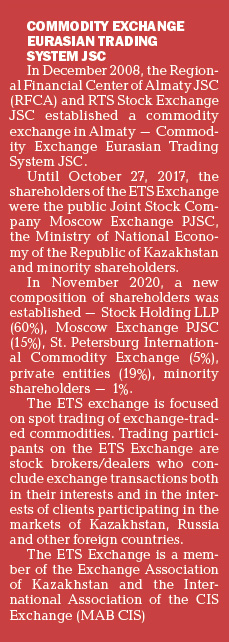Projects
Oil products go to the stock exchange
Jet fuel
On September 29, the first aviation fuel exchange auctions in Kazakhstan took place at the ETS Commodity Exchange JSC platform. During the trading session, 278 mln tenge worth of jet fuel was sold at a price ranging from 224.4 thousand to 227.8 thousand tenge per ton, the Exchange Committee of Kazakhstan's Agency for the Protection and Development of Competition reports.
"The total trading volume for four buyers amounted to 1,235 tons with a cash turnover of 277.8 mln tenge," the report says on the agency's official website. According to the exchange information, the weighted average index of PT grade jet fuel produced by Atyrau Refinery is 227,766 tenge per ton, Pavlodar Petrochemical Plant is 224,400 tenge per ton, TC-1 grade produced by PetroKazakhstan Oil Products plant is 224,400 tenge per ton. Jet fuel is already the fourth position among oil and gas products sold through the stock exchange, after gasoline, liquefied petroleum gas and bitumen.
Stock trading

Exchange trading as a form of petroleum products trading was launched in Kazakhstan in March 2021. Following the action plan for the implementation of the Address of the President of Kazakhstan Kassym-Jomart Tokayev dated September 1, 2020, the list of products for exchange trading was expanded. After that, it was necessary to amend the current legislation, in particular, to determine the list of exchanges for petroleum products trading because there was no reason to disperse between all 18 exchange platforms operating in the country. For this purpose, amendments were made to the Law of the Republic of Kazakhstan "On Commodity Exchanges".
Initially, it was assumed that by the end of 2021, 10% of gasoline, diesel fuel, jet fuel and bitumen produced in the country would be sold through the exchange. The strategic goal in the National Plan for the Development of Competition is to reach the volume of exchange sales by 2025 of 20% of the produced petroleum products.
Bidding is designed to promote competition, increase market transparency and clear and more objective pricing mechanisms. Chairman of the Oil and Gas Industry Committee of the Presidium of the Atameken National Chamber of Entrepreneurs, Daniyar Abulgazin, says that to stabilize prices for gasoline and diesel fuel in the country and attract players to the exchange, a normal economic price formation tool is needed, which should take into account all costs – extraction, delivery of raw materials to the plant, production, delivery of petroleum products to the bases and retail sale.
As Nurzhan Begalin, General Adviser of the Exchange Association of Kazakhstan, says, there are two specific reasons why the exchange trade in petroleum products began right now – one external, the other internal. Exchange trading increases the efficiency of any commodity market. After the modernization of all three refineries, Kazakhstan began to cover the needs of the domestic fuel market completely, and it's time to streamline the rules of the game on it. External circumstances – Kazakhstan's participation in trade unions with partners, primarily with Russia. By 2025, it is planned to unite the energy markets of Russia, Kazakhstan, Belarus, Armenia and Kyrgyzstan within the framework of the Eurasian Economic Union. This implies the transfusion of both market participants and the flow of petroleum products.
De jure and de facto, conditions for competition between the energy sectors of different countries are being created rapidly. You need to prepare for the competition in advance. Today, the difference between the cost of high-octane gasoline at gas stations in Kazakhstan and Russia is up to 100 tenge, which leads to the export of fuel via illegal schemes and periodically arising situations with fuel shortage in Kazakhstan.



